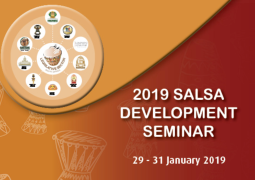
Presenting the topic on “Economic Growth and the Pursuit of Inequality Reduction in Africa”, Prof Haroon Bharat of the University of Cape Town gave some interesting foresights on growth, poverty and employment future scenarios in Sub-Sahara Africa during the second-day of the Salsa Development Seminar which is underway at the Crystal Towers Hotel in Century City.
His presentation negated the data that underpinned the Africa Rising notion of early to mid-2000s, which presented the Sub-Saharan region as a hub for consumer market. According to him, this data treated Africa as a country and failed to consider the multiple strands that differentiated each country’s economic profile. “The story of Africa Rising was partially true because it treated Africa as a country rather than a continent made up of countries with different economic growth trajectories. If one does that, one would realise that the consumer wealth of Africa was overstated by this data. And there were lots of caveats that it did not take into consideration.”
Instead of breaking this data into regional economic blocks, it generalised its projections. That is where the fault of its projections lies. As such, it treated Africa as a homogenous economy rather than a continent with varied economic activities, determined by varied economic legacies and activities, he said. “This data overlooked the fact that countries have varied growth paths.”
He delineated the factors that gave impetus to this notion. “This growth projection was based on the commodity growth path of high oil, gold and platinum crisis, results of which led to great optimism on the rise of the consumer market in Africa, which billed it as the next world’s growing market.”
At the heart of inequality reduction, he maintained, is poverty reduction. But what complicates the efforts to achieve that is over-reliance on any economic growth projection as a panacea to it (poverty reduction). “Growth in income does not, for instance, translate into poverty reduction. There are growth patterns in countries with high inequality which don’t translate into poverty reduction. In some instances, growth will create wealth, but for a few like in the South African situation, which has a high rate of inequality.”
To him, the chief indicator of growth is inequality. “if physical capital is not distributed equally as in South Africa, growth alone is not enough to turn the tide of poverty.”
He urged the that it was time for the African Union (AU) to have a pointed focus on the countries that have high rate of poverty rather than treat this matter in a general manner. “If the AU’s 2063 Agenda on poverty eradication were to succeed, it needs to focus on countries that need stringent interventions in this regard, rather than make general statements that lack poignancy.”
One of the challenges that Africa is faced with is unemployment, he said. But youth unemployment remains a teething matter. “Future employment efforts must endeavour to create youth employment. But we have to see in which markets will they get those jobs. This is what preoccupies the donor communities currently. But most of all, we have to understand the nature and size of this beast whose numbers are astounding.”
What puts a spanner in the works is that Africa’s youth population is growing exponentially. And so are the demands for new employment opportunities, he claimed. But sadly, the new future employment prospects of the continent are bleak. “As such, South Africa is the only country on the continent that has a 50% workforce in wage employment, while the rest of the countries’ employment is mainly in subsistence farming and low productivity employment.”
He also listed the heavy reliance on resource-based economies as emerging barriers to long-term growth. “Resource-based economies are capital-intensive and are unlikely to create jobs for the poor or to eradicate inequality.”
These economies, which are licence-based, are often riddled with governance challenges and are prone to corruption. “We know and have heard of how mining licences are granted on the continent. And research has shown that there are high levels of corruption in resource-based economies. This is due to the inappropriate handing of licences to companies that are willing to pay bribes to the powers that be or to the politically connected.”
This has had a negative impact on the mining share GDP of many countries, including South Africa, he claimed. “This has undermined investment levels, has brought challenges of policy uncertainty and mining share GDP, among other things. All these factors point to the governance challenges of licence-based economies.”
By Abel Mputing
30 January 2019

